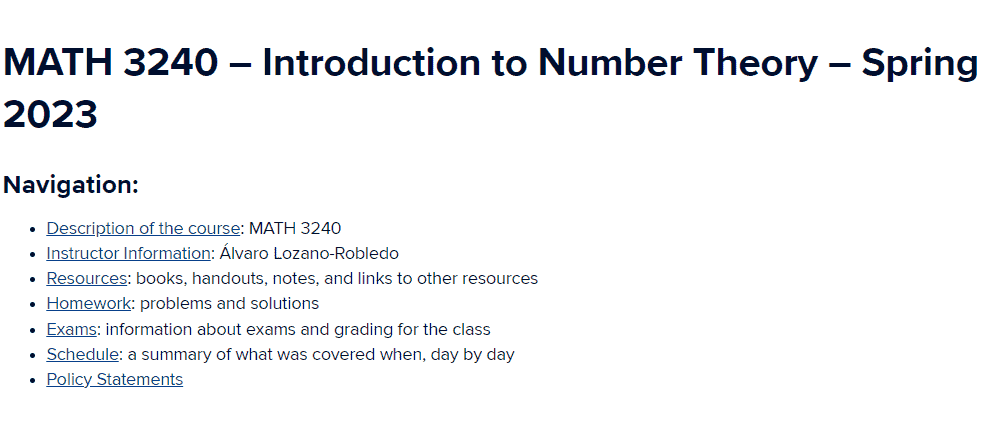MY-ASSIGNMENTEXPERT™可以为您提供courses MATH3240 Number theory数论的代写代考和辅导服务!
这是美国康涅狄格大学数论课程的代写成功案例。

MATH3240简介
Number theory is the study of the integers, but this description hardly conveys the beauty of this part of mathematics. One of the main goals of this course is pedagogical: to see that mathematics is a vibrant intellectual activity and not a set of fixed rules developed by some higher authority. This viewpoint is especially useful for future teachers. Students will carry out many numerical experiments, generate conjectures based on patterns observed, and then prove or disprove these conjectures.
Prerequisites
The content focuses on those parts of classical number theory which still have modern relevance in the subject: the Euclidean algorithm, modular arithmetic, distribution of primes, diophantine equations, applications to cryptography, arithmetic in quadratic rings and polynomial rings, and quadratic reciprocity. The examples in this course will provide a lot of food for thought for anyone who later takes abstract algebra.
Prerequisites: A grade of C or better in MATH 2142 or 2710.
Credits: 3
MATH3240 Number theory HELP(EXAM HELP, ONLINE TUTOR)
Prove that $1^3+2^3+\cdots+n^3=\left(\frac{n(n+1)}{2}\right)^2$, for all $n \geq 1$.
Solution:
We use induction. The base case is $n=1$ which is obvious:
$$
1=1^3=\left(\frac{1 \cdot 2}{2}\right)^2=1^2=1
$$
Now, let us prove the induction step. For this, assume that the result is true for some $n \geq 1$ and we need to prove that the result is true for $n+1$. Hence, we need to prove:
$$
1^3+2^3+\cdots+n^3+(n+1)^3=?\left(\frac{(n+1)(n+2)}{2}\right)^2 .
$$
This is indeed true because:
$$
\begin{aligned}
1^3+2^3+\cdots+n^3+(n+1)^3 & =\left(\frac{n(n+1)}{2}\right)^2+(n+1)^3 \
& =\frac{n^2(n+1)^2}{4}+(n+1)^3 \
& =(n+1)^2 \cdot\left(\frac{n^2}{4}+(n+1)\right) \
& =(n+1)^2 \cdot\left(\frac{n^2+4 n+4}{4}\right) \
& =\frac{(n+1)^2(n+2)^2}{4}=\left(\frac{(n+1)(n+2)}{2}\right)^2
\end{aligned}
$$
This proves the induction step. Hence, by the Principle of Mathematical Induction, the equality is true for all $n \geq 1$.
(a) Prove that, for all $n \geq 1$, we have:
$$
\frac{1}{1-x}=1+x+x^2+\cdots+x^{n-1}+\frac{x^n}{1-x} .
$$
(b) Prove that for all $n \geq 1,1+2+2^2+\cdots+2^{n-1}=2^n-1$.
(a). We will use induction. The base case ( $n=1)$ is “trivial” (= almost obvious):
$$
1+\frac{x}{1-x}=\frac{1-x+x}{1-x}=\frac{1}{1-x}
$$
Now we prove the induction step. Suppose the equality is true for some $n \geq 1$ and we want to prove it for $n+1$. Since we can assume the equality for $n$, we also know that:
$$
\frac{1}{1-x}-\frac{x^n}{1-x}=1+x+x^2+\cdots+x^{n-1}
$$
We will use the above equation below. At this point, it remains to verify the following equality:
Let’s start working with the right hand side:
$$
\begin{aligned}
1+x+x^2+\cdots+x^{n-1}+x^n+\frac{x^{n+1}}{1-x} & =\frac{1}{1-x}-\frac{x^n}{1-x}+x^n+\frac{x^{n+1}}{1-x} \
& =\frac{1-x^n+x^n(1-x)+x^{n+1}}{1-x} \
& =\frac{1-x^n+x^n-x^{n+1}+x^{n+1}}{1-x}=\frac{1}{1-x}
\end{aligned}
$$
as desired. Hence, the induction step is proven, and by the Principle of Mathematical Induction, the equality is true for all $n \geq 1$.
(b). Now, plug $x=2$ in the equality we just prove to get:
$$
\frac{1}{1-2}=1+2+2^2+\cdots+2^{n-1}+\frac{2^n}{1-2}
$$
or
$$
2^n-1=1+2+2^2+\cdots+2^{n-1}
$$
as needed.
Prove that 5 divides $3^{4 n}-1$, for all $n \geq 1$.
Solution:
We use Induction. The base case, $n=1$ is clear since $3^4-1=80=5 \cdot 16$ is divisible by 5 . Now suppose that this property is true for some $n \geq 1$ and so, $3^{4 n}-1$ is divisible by 5 . Let us write then $3^{4 n}-1=5 k$ for some natural number $k \geq 1$. We need to prove that $3^{4(n+1)}-1$ is also divisible by 5 . But:
$$
3^{4 n+4}-1=3^4\left(3^{4 n}\right)-1=81(5 k+1)-1=405 k+81-1=405 k+80=5 \cdot(81 k+16) \text {. }
$$
Hence, $3^{4(n+1)}-1$ is also divisible by 5 . Hence, the induction step is proven, and by the Principle of Mathematical Induction, the property is true for all $n \geq 1$.

MY-ASSIGNMENTEXPERT™可以为您提供COURSES MATH3240 NUMBER THEORY数论的代写代考和辅导服务!


